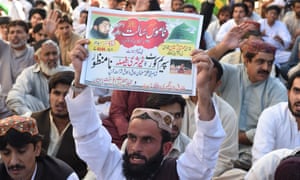Government urged to ensure charges are never ‘trumped up’ as Islamic republic’s top court gives further succour to liberals on controversial issue
 Pakistan’s supreme court has called on the country’s politicians to ensure that hundreds of people facing imprisonment and even execution under controversial blasphemy laws have not been falsely charged, often by enemies wanting to settle personal scores.
Pakistan’s supreme court has called on the country’s politicians to ensure that hundreds of people facing imprisonment and even execution under controversial blasphemy laws have not been falsely charged, often by enemies wanting to settle personal scores.
Blasphemy is a hugely sensitive issue in Pakistan, an Islamic republic, with even unproven allegations provoking mob lynchings and violence.
Critics, including European governments, claim the laws are misused, with hundreds languishing in jails under false charges that could see them face fines, life imprisonment or hanging.
On Tuesday, the supreme court issued a detailed judgment warning that in Islam a false accusation can be as serious as the blasphemy itself.
The judgment came weeks after it upheld the death sentence for Mumtaz Qadri, a former bodyguard who was feted by Islamists after he gunned down a politician who had been calling for blasphemy law reform.
Moderates hailed the Qadri ruling as a blow against religious extremism, and on Tuesday the supreme court appeared to take another step in that direction.
Blasphemy is “abhorrent and immoral”, the judgment said, “but at the same time a false allegation regarding commission of such an offence is equally detestable besides being culpable.”
“It is, therefore, for the State of the Islamic Republic of Pakistan to ensure that no innocent person is compelled or constrained to face an investigation or a trial on the basis of false or trumped-up allegations regarding commission of such an offence,” the ruling continued.
Qadri shot the liberal governor of Punjab, Salman Taseer, in the capital, Islamabad, in 2011. Taseer had called for reforms to the blasphemy legislation and promised to help Asia Bibi, a Christian woman who had been on death row for five years for blasphemy after an argument with a Muslim woman.
In its judgment on Tuesday, the court also said that calls for blasphemy law reform “ought not to be mistaken as a call for doing away with that law”.
Instead they should be seen as calls for introducing “adequate safeguards” against “malicious application” of the law.
On Wednesday, 500 activists from the Islamist groups Jamiat Ulema e Pakistan (JUP) and Jamaat Ahle Sunnat held a rally in the north-western city of Peshawar to denounce the court’s Qadri verdict.
In a speech inciting vigilantism, cleric Mufti Meraj-ud-Din, of the JUP, said that if Qadri is executed those responsible should also be put to death.
The Guardian